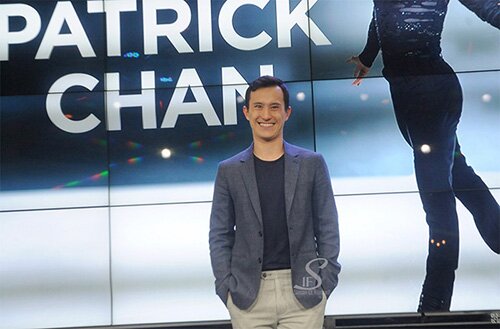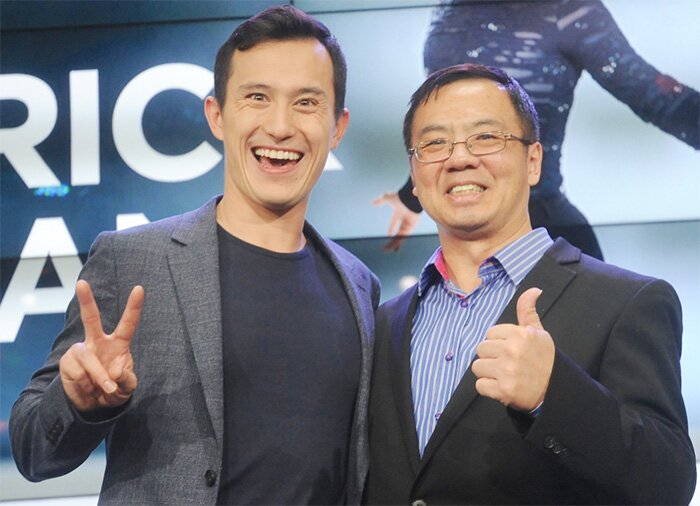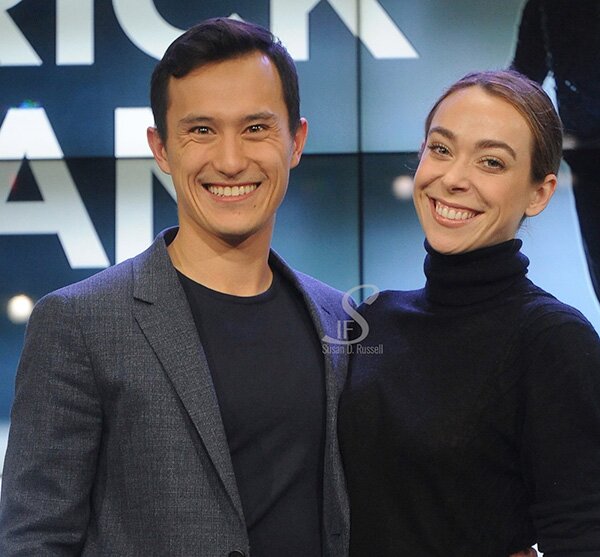

A nasty spring ice storm delayed his retirement announcement for a day — but Patrick Chan knows the best-laid plans do not always work out just the way you would like them to, and how life’s twists and turns can take you places you had never imagined you would go.
The 10-time Canadian champion has decided it is time to be something else other than a competitive figure skater. And he made that sentiment official on Monday when he announced his retirement from the sport at the CBC Broadcast Centre in downtown Toronto.
He leaves figure skating after a career that earned him three Olympic medals, three World titles and two Grand Prix Final victories. For the 27-year-old Chan, the time was right to begin transitioning into the next phase of his life, whatever that may bring him.
“I just knew that even if I didn’t have anything set in stone for plans post-competitive career, that I needed to take that step forward,” he said. “And I knew the next part in my life won’t start until I take my first step into it. It’s a scary feeling and it’s stressful, but at the same time I feel like it really is a perfect, full novel that I’ve written on the ice. “Skating has taken a big part of my life, and now I’m ready to take what it’s given me and transfer it over into something else.”
If all had gone as planned, Chan would have made this announcement on Sunday at Flat Rock Cellars, a Niagara Region winery where he released a sparkling white wine with his name on it on Saturday. But Mother Nature had other plans and instead, Chan and his girlfriend, Liz Putnam, made what she described as a harrowing drive back to Toronto for Monday’s event. They stayed with friends on Sunday night and when the power went out due to the winter storm, they worked on his farewell speech by candlelight.
It was a heart-felt speech in which Chan, speaking in front of a group that included family, friends and some of his closest supporters, took time to thank behind-the-scenes people like the man who looked after his skate boots and blades. The sponsors that helped get him to competitions. And the choreographer, David Wilson, without whose brilliance, Chan said, “I would not be where I am today.”
Chan had special words for the legendary coach, the late Osborne Colson, “who got me gliding on the right foot” toward future success. “His relentless push for success was sometimes overwhelming, but his imagination was infectious and his wisdom everlasting. He always seemed to know what the future held for me, but he never spoke of it.”
The deepest gratitude was saved for his parents, Lewis and Karen (she was in Vancouver and unable to attend the event). Chan’s voice cracked with emotion as he spoke of “only now realizing just how much you’ve had to sacrifice” for his skating dreams. Both were in PyeongChang, South Korea, in February to watch their son skate competitively for the last time.
 “For an athlete’s competitive journey, Olympic gold seems to be the only ultimate prize in amateur sports. Some say it is the definition of success and a chance to be someone, like Willie Wonka’s golden ticket,” he said. “But at the end of the day, you make it what you want. Seeing my parents smiling in the stands and cheering loud at my last Olympic Games was my golden ticket. They were there before I dreamed of winning, and they’re still here at the end with the same smile that I recognized from Day 1.”
“For an athlete’s competitive journey, Olympic gold seems to be the only ultimate prize in amateur sports. Some say it is the definition of success and a chance to be someone, like Willie Wonka’s golden ticket,” he said. “But at the end of the day, you make it what you want. Seeing my parents smiling in the stands and cheering loud at my last Olympic Games was my golden ticket. They were there before I dreamed of winning, and they’re still here at the end with the same smile that I recognized from Day 1.”
In truth, the retirement decision is one that Chan might have made four years ago. He had won three straight World titles from 2011-13, then claimed two silver medals (individual and team) at the Olympic Winter Games in Sochi, Russia. Chan could have closed the book right then and there and skated off into the next chapter of his life.
But after taking a year off, the lure of one final Olympics in 2018 PyeongChang, South Korea, brought him back to the competitive world. As it turned out, that world had changed dramatically, filled with younger skaters who owned a bounty of quadruple jumps, and there would be no more World medals or final individual Olympic glory in PyeongChang.
Despite all that, Chan believes he is leaving on his own terms, exactly as any great champion would want it. “With the situation the sport is in now, with the competitiveness and young-ness of it, some could say I was forced out … but I have no regrets or any ill feeling about making this decision now to retire from figure skating,” he said. “Part of becoming a champion is sometimes knowing when to let go and when to move on and when it is the end.”
Was the comeback worth it? When Chan reflects now, he will tell you the gold medal he won in the Team Event in PyeongChang with his best friends in skating makes the answer to that question a resounding yes. He considers it the most cherished medal of his decorated career, and not just because of the color of it. His reaction at the medal ceremony in South Korea offered proof positive of that.
“I was giddy with excitement, because I had been waiting for that day,” he said of the Olympic gold. “The fascinating thing is, I never imagined it would happen the way that it did. The path and the storyline to that gold medal would have been different if you had asked me about it four years ago. But that’s the beauty in life — things don’t always turn out the way you always planned it exactly.
“So now that I’m at the end of it, yes (that made it worth it). Coming back and seeing how the sport had evolved, there were many times when I was questioning it, and thinking, ‘why did I even bother?’ and ‘was Sochi really the peak of my career?’” But I was pleasantly surprised (how my feelings changed) and now that we’re here post-2018, I’m so proud and lucky to have been surrounded by the right people that supported me when I needed it the most.”
Indeed, Chan will tell you now that the last three years of his career were the most trying of them all, and maybe the victory came in battling his way through the ups and downs that carried him to the finish line.
“The way the results turned out, it wasn’t the prettiest three years after 2014,” he said. “It came with the biggest challenges and it was the most mentally demanding time of my career. Everything has changed about the sport, and I’ve changed on top of that. But it was a great test of my ability to just find it in me to dig deep and find my limits and push through those limits of stress and frustration and anger to find those little lights at the end of the tunnel.”
Chan came into his final season with two goals — to win a record 10th Canadian men’s title, and the team gold in PyeongChang — and said achieving them “is something I can be proud of.”
But he leaves figure skating with a legacy that goes beyond the medals and the Championships. “Patrick has changed men’s skating by making the artistry and the technical and skating skills the requirements that they are today,” said Mike Slipchuk, Skate Canada’s high-performance director. “To see Patrick skate live gave you a real sense of the speed and flow of his effortless skating and his technical skills.”
 So now that is over, what comes next? Firstly, Chan plans to move into the show world, at least through 2019, which will give him a chance to reunite with his good friends and long-time Canadian teammates Tessa Virtue, Scott Moir, Meagan Duhamel and Eric Radford.
So now that is over, what comes next? Firstly, Chan plans to move into the show world, at least through 2019, which will give him a chance to reunite with his good friends and long-time Canadian teammates Tessa Virtue, Scott Moir, Meagan Duhamel and Eric Radford.
Chan also has not given up on plans to open up a skating school in Vancouver — “that’s just a matter of time” — and he is also exploring the possibility of getting into the world of commercial real estate.
What is for certain is that Vancouver, the city that he moved to last fall to reinvigorate himself for the final push to PyeongChang, will remain home for the foreseeable future. He and Putnam are renting an apartment in the popular Kitsilano area of the city, with stunning views of English Bay, North Vancouver and the Coast Mountains.
“How can you beat that?” said Chan. “There’s something beautiful about that city, and something that many Torontonians won’t understand. I grew up athletic as heck and my parents put me into everything — every sport along with figure skating. I just want to get back to that, and I find so much joy and exhilaration in that.”
Watch Skate Canada’s Retirement Tribute to Patrick Chan
Video of Patrick Chan’s Retirement Speech
FLASHBACK TO JANURAY 21, 2016:
Patrick Chan spoke to the media today in a post-practice scrum at 2016 Canadian nationals about how he considered quitting after the Grand Prix Final.
“I’ll be honest, after the Final, I definitely had a week where I didn’t want to be at the rink – I didn’t want to be there. I skated a session and said, ‘Screw it, I just want to get off. I’m just not there mentally, I’m just checked out.’ I’ve come very close to just calling it quits and moving on because I have so many things that I’m looking forward to (in the future). Not that I found them out last year, it’s just an ongoing thing.
“Even now, I’m just dealing with things that a 25-year-old man is going to deal with. I have to move on from competing at some point, it’s whether I want to do it now, or do I want to do it in two years. But then there’s little reminders (about why I want to stay), even today in practice and I’m sure tomorrow competing, I have moments where I think, ‘Wow, I love this.’ I love this feeling of being on the ice and landing a quad and really feeling great skating and being healthy.”
When asked if coming back to competition was tougher than he expected? “It’s not easy. I tell everyone that, coming back is not an easy feat. Kathy and I have spent many, many, many hours ripping each other’s hairs out, and just yelling. Not mad at each other necessarily, but made at the situation and mad at ourselves. It’s a rollercoaster ride for sure. There’s times where we get into really heated conversations and I’m like, ‘Wow, I’ve never been this mad ever in my life.’ It’s a blast, though, because with that huge low, there’s a lot of highs in my life competing. It’s scary, though. I’m telling you, competing is scary. I’ll be honest, I’m not going to sugarcoat it by saying ‘it’s great, it’s a lot of fun, it’s all happy.’
“No, it’s definitely a lot of work and concentration and planning and sitting down. As much as I don’t want to talk about strategizing and planning ahead toward the World Championships. My schedule has to be made in advance. Those things are not fun. But I can’t just be winging it, I’ve got to be responsible and really want it.”
RELATED CONTENT:
PATRICK CHAN EMBRACING THE TRANSITION
PATRICK CHAN SKATES IN NEW DIRECTIONS (2016)




